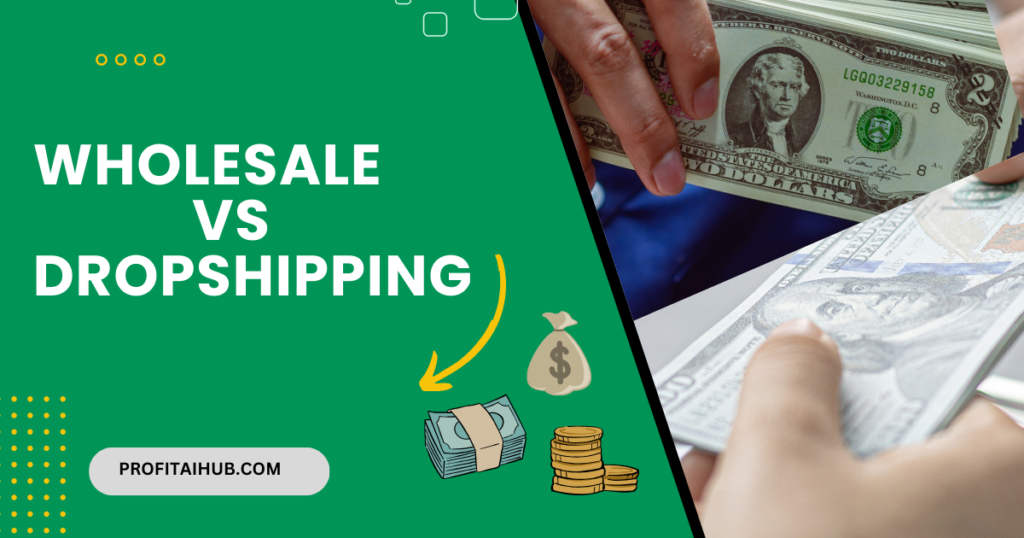Your success roadmap is your business model—it guides how you deliver goods to customers, run, and make revenue. Among different models, dropshipping and wholesale are appealing choices for people starting online enterprises. Dropshipping vs. Wholesale: Which is best? Learn from this article.
Choosing the Right Business Model
One approach is to examining these possibilities might be rather daunting. Your revenue, customer satisfaction, and future growth could suffer from choosing an inappropriate business model. Imagine you find a business model that is not perfect for your objectives after spending much time and energy. Any difference could lead to wasted resources and missed chances of growth. This is why knowing every small thing about each business model is vital before you pick.
The differences between dropshipping and wholesale will be investigated in this article. We want to help you figure out which model best fits your corporate goals. We will highlight both the benefits and drawbacks of each, offer concrete cases, and offer perspectives to help you make a sound decision.
What is Dropshipping?
Dropshipping entails the selling of items on your behalf directly by a manufacturer, supplier, or retailer, so you don’t have to have stock on hand. With dropshipping, you can promote items without having any inventory. You obtain the product from a supplier when a consumer buys from your online store, which will then deliver it straight to the customer.
With this setup, you don’t have to personally handle or store the items and nor confront shipping costs. Your focus is on running your internet store, marketing your items, and guaranteeing customer support rather.
The Benefits of Dropshipping
Small First Phases
Dropshipping’s low initial investment requirement is among its main advantages. Business owners in this model might investigate different sectors and channel funds correctly. For fresh businesspeople who might be hesitant to spend much on inventory, starting a company with little financial risk is especially appealing.
Assortment of Items Not Stored
With dropshipping, you can peruse an enormous range of products without the need to store them. Whether by establishing an online presence or engaging customers firsthand, this adaptability allows you to follow current market trends and satisfy consumer demands. It raises your chances of success and gives opportunities for corporate expansion in tune with changing market circumstances.
Simpler Logistics
Dropshipping allows company owners to focus on their internet operations since their supplier handles inventory and deliveries. This gives you time to create your store and improve your internet presence.
Dropshipping Drawbacks
Lower Profit Margins
Dropshipping has one major drawback: as opposed to other corporate models like wholesale, profit margins are lower. The cost per unit usually rises from buying small quantities, one item at a time, to purchasing larger batches. The dropshipping strategy, therefore, can work well but especially under circumstances whereby one acquires in larger quantities. Moreover, dropshipping businesses usually have to compete on cost to attract customers, thereby squeezing their margins.
Restricted Observation on Product Quality
Sellers can run into problems when handling clients if they have a strong dependency on suppliers for product quality. Even though there is little you can do about them, if a supplier is late with a delivery or sends a subpar product, it could harm your brand reputation. Your brand’s image rests with the supplier, so the seller has no means to change things.
Aggressive Rivalry and Market Saturation
The simplicity of beginning a dropshipping company has enticed many fresh entrepreneurs, thereby causing stiff competition and popular market areas being overrun. Creating a different brand identity and marketing yourself may be difficult, given that many dropshipping stores sell identical products. Companies, fighting to attract customers, therefore sometimes cut prices, affecting even more their profit margins.
What is Wholesale?
One wherein goods are bought in quantities directly from producers or distributors at reduced costs and resold to customers at a more retail price is a wholesale strategy.
It signifies owning and managing one’s stock, contrary to dropshipping systems, which buy goods for the online sales shop without actually holding anything. It would include taking care of your stock inventory, making sure that the quality of goods, packaging, and shipping components are within your standards.
Having to buy large numbers means that wholesale incurs high initial costs. Nevertheless, it does allow you to bargain well with the vendors, keeping selling prices high and hence profits per unit when sold at wholesale. Wholesale generally suits very well well-established companies, which have the infrastructure and means to handle their stock.
The Benefits of Wholesale Trading
More Profitable Margins
One great thing about wholesale is the possibility of boosted profit margins. Favourable deals from wholesalers will let you substantially increase your revenues and give you a competitive edge in the market. Purchasing things in bulk at lower prices per unit rather than individually, as in dropshipping, helps you to establish higher prices for clients, therefore increasing profit for every transaction. Wholesale might be a more profitable option for companies pursuing increased revenue.
Complete Control in Branding and Quality
You have total control over the merchandise you present in the wholesale model. This lets you select suppliers that meet your quality standards as well as verify that the goods match your brand aesthetic. Moreover, by inspecting the goods before they reach your customers, you reduce the probability of sending out low-quality or damaged goods since you control the inventory. This level of control also pertains to branding and packaging, therefore enabling you to shape a customer experience that is custom and consistent.
Possibility for More Solid Customer Connections
Wholesale will let you have closer relationships with your customers. You can offer faster shipping, more custom service, and better customer service, given your control of the inventory and distribution. Developing these strong ties can improve customer loyalty and stimulate repeat buying, which are both critical for long-term success. Having products already available also lets you easily handle consumer inquiries and issues, therefore improving the general customer experience.
The Drawbacks of Wholesale Buying
More First Investment
Starting a wholesale company calls for a significant initial capital investment, which is one of the major stumbling blocks. The upfront costs might be far different from those with dropshipping since you are acquiring stock in great volumes. Thus, you must have more money on hand for buying inventory, managing storage, and covering other operating costs, including warehousing, logistics, and insurance.
Daunting Inventory Control
Wholesale demands inventory management, which can sometimes be a difficult part of your company. One can prevent both excessive stock and scarcity of desired things by keeping inventory levels, arranging storage locations, and forecasting consumer demand. This calls for careful preparation and use of inventory management solutions, which could raise your costs and your workload.
Expanded Functionality
Running a wholesale company implies more types of tasks to be handled than with dropshipping. From sourcing and procurement to supervising supply chain operations—where products are stored, packed, and shipped to consumers—you will be in charge of everything.
Dropshipping vs. Wholesale: Main Differences
| Category | Dropshipping | Wholesale |
| Startup Costs | Low startup cost | Higher startup costs |
| Inventory Management | No inventory management required | Requires purchasing, storing, and managing inventory |
| Profit Margins | Lower profit margins | Higher profit margins |
| Scalability | Highly scalable | Requires more investment |
| Supplier Relationships | Less personal | Close, long-term relationships |
| Product Range | Wide product range | Limited by inventory capacity |
Choosing Wholesale or Dropshipping
When Choosing a Dropshipping Firm
For first-time entrepreneurs with limited financing, dropshipping is the best business idea for someone with little funds intending to start an internet business.
When Should You Choose a Wholesale Merchant?
If you already have enough funds and a faithful client base, wholesale can offer more profitability and control.
Conclusion
Whether to go for dropshipping or wholesale is an important decision that will affect the course of your online enterprise.
FAQs
Is dropshipping better for beginners?
yes
Does wholesale generate more cash than dropshipping?
Yes
Will changing from dropshipping to wholesale be simple?
Yes
Which model has more flexibility?
Wholesale



